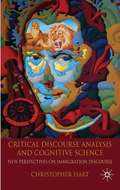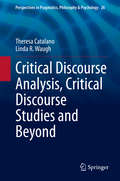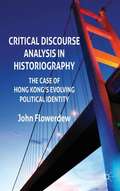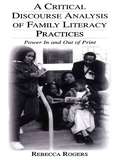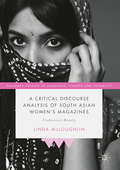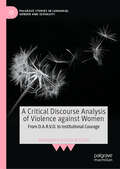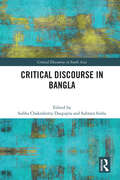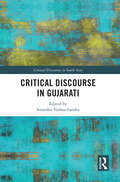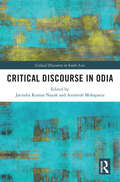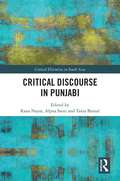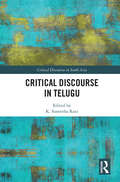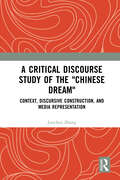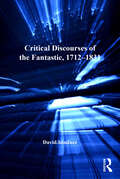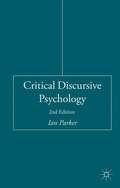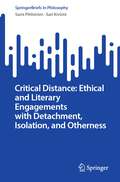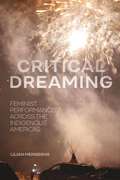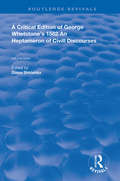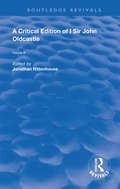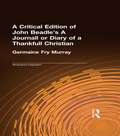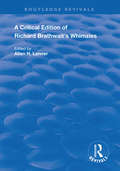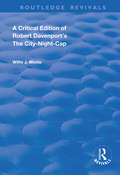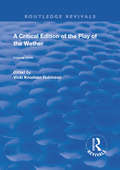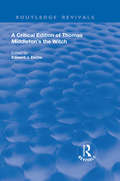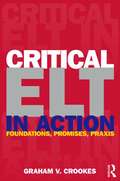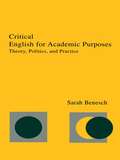- Table View
- List View
Critical Discourse Analysis and Cognitive Science: New Perspectives on Immigration Discourse
by Christopher HartThis study advances a model for Critical Discourse Analysis which draws on Evolutionary Psychology and Cognitive Linguistics, applied in a critical analysis of immigration discourse. It will be of special interest to students and researchers with which to explore new perspectives in CDA.
Critical Discourse Analysis, Critical Discourse Studies and Beyond (Perspectives in Pragmatics, Philosophy & Psychology #26)
by Linda R. Waugh Theresa CatalanoThis book explores the problem-oriented interdisciplinary research movement comprised of Critical Discourse Analysis (CDA) and Critical Discourse Studies (CDS) for scholars, teachers, and students from many backgrounds. Beginning with a Preface by renowned CDA/CDS scholar Ruth Wodak, it introduces CDA/CDS through examples of what its research looks like, delineates various precursors to CDA/CDS and important foundational concepts and theories, and traces its development from its early years until it became established. After the relationship between CDA and CDS is discussed, seven commonly cited approaches to CDA/CDS are outlined, including their connections and differences, their origins and development, major and associated scholars, research focus(es), and central concepts and distinguishing features. After a summary of critiques of CDA/CDS and responses by CDA/CDS scholars, the book provides an overview of its salient connections to other interdisciplinary areas of scholarship such as critical applied linguistics, education, anthropology/ ethnography, sociolinguistics, gender studies, queer linguistics, pragmatics and ecolinguistics. The final chapter describes how scholars use their knowledge of CDA/CDS to make a difference in the world.
Critical Discourse Analysis in Historiography
by John FlowerdewJohn Flowerdew shows how the critical analysis of the evolving discourse employed during a political process spanning more than a decade can provide both insights for discourse analysis and understanding of a real world political process, thereby demonstrating the potential role for critical discourse analysis in historiography, the writing of history. The political process in question is Hong Kong's transition of sovereignty from Great Britain to China. The book analyses the discourse of the outgoing British administration, on the one hand, and the creation of the new discourse of the Special Administrative Region of China, on the other. In addition, the book considers issues of intercultural discourse, where the two competing discourses come into contact and conflict. Individual chapters of the book, in the form of case studies, deal with different communicative events set piece speeches, public meetings, news articles, interviews, and television addresses. "
A Critical Discourse Analysis of Family Literacy Practices: Power in and Out of Print
by Rebecca RogersIn this groundbreaking, cross-disciplinary book, Rebecca Rogers explores the complexity of family literacy practices through an in-depth case study of one family, the attendant issues of power and identity, and contemporary social debates about the connections between literacy and society. The study focuses on June Treader and her daughter Vicky, urban African Americans labeled as "low income" and "low literate." Using participant-observation, ethnographic interviewing, photography, document collection, and discourse analysis, Rogers describes and explains the complexities of identity, power, and discursive practices that June and Vicky engage with in their daily life as they proficiently, critically, and strategically negotiate language and literacy in their home and community. She explores why, despite their proficiencies, neither June or Vicky sees themselves as literate, and how this and other contradictions prevent them from transforming their literate capital into social profit. This study contributes in multiple ways to extending both theoretically and empirically existing research on literacy, identity, and power: * Critical discourse analysis. The analytic technique of critical discourse analysis is brought into the area of family literacy. The detailed explanation, interpretation, and demonstration of critical discourse analysis will be extremely helpful for novices learning to use this technique. This is a timely book, for there are few ethnographic studies exploring the usefulness and limits of critical discourse analysis. * Combines critical discourse analysis and ethnography. This new synthesis, which is thoroughly illustrated, offers an explanatory framework for the stronghold of institutional discursive power. Using critical discourse analysis as a methodological tool in order to build critical language awareness in classrooms and schools, educators working toward a critical social democracy may be better armed to recognize sources of inequity. * Researcher reflexivity. Unlike most critical discourse analyses, throughout the book the researcher and analyst is clearly visible and complicated into the role of power and language. This practice allows clearer analysis of the ethical, moral, and theoretical implications in conducting ethnographic research concerned with issues of power. * A critical perspective on family literacy. Many discussions of family literacy do not acknowledge the raced, classed, and gendered nature of interacting with texts that constitutes a family's literacy practices. This book makes clear how the power relationships that are acquired as children and adults interact with literacy in the many domains of a family's literacy lives. A Critical Discourse Analysis of Family Literacy Practices: Power In and Out of Print will interest researchers and practitioners in the fields of qualitative methodology, discourse analysis, critical discourse studies, literacy education, and adult literacy, and is highly relevant as a text for courses in these areas.
A Critical Discourse Analysis of South Asian Women's Magazines: Undercover Beauty (Palgrave Studies in Language, Gender and Sexuality)
by Linda McloughlinThis intriguing book applies Critical Discourse Analysis to a range of South Asian women’s lifestyle magazines, exposing the disconnection between the magazines’ representations of South Asian women and the lived realities of the target audience. The author challenges the notion that discourses of freedom and choice employed by women’s magazines are emancipatory, demonstrating instead that the version of feminism on offer is a commodified form which accords with the commercial aims of the publications. McLoughlin demonstrates that whilst British magazines present women in the East as the exotic and culturally superior ‘Other’, women in India are encouraged to emulate Western women to signify their engagement with globalization and modernity. She uses data from focus groups carried out in both countries to illustrate the interpretive frameworks and multivocality of participants’ attitudes, experiences and beliefs. This thought-provoking book will appeal to students and researchers of Language and Linguistics, Women’s Studies, Anthropology, Sociology, Media, Communications and Cultural Studies.
A Critical Discourse Analysis of Violence against Women: From D.A.R.V.O. to Institutional Courage (Palgrave Studies in Language, Gender and Sexuality)
by Giuseppina Scotto di CarloThis book presents a critical analysis of the language surrounding Violence against Women and Girls (VAWG), demonstrating how discourse can both sustain harm and serve as a catalyst for healing and change. Grounded in Critical Discourse Analysis (CDA), it examines the &“DARVO&” tactic—Deny, Attack, Reverse Victim and Offender (Freyd, 1997)—a manipulative strategy used by perpetrators to evade accountability, silence survivors, and reinforce a culture of victim-blaming. Through detailed case studies, the book uncovers the broader societal structures that enable and normalise these behaviours. To counteract these harmful dynamics, the author introduces the concept of &“institutional courage&” (Freyd, 1997), providing a framework for institutions to respond more effectively and empathetically to VAWG. Ultimately, the book advocates for a shift in both individual and institutional responses, urging a collective commitment to challenge DARVO and adopt institutional courage in the fight against VAWG. This work will be of particular interest to scholars, practitioners, and students across Linguistics, Women&’s and Gender Studies, Sociology, and Institutional Discourse.
Critical Discourse in Bangla (Critical Discourses in South Asia)
by Subha Chakraborty Dasgupta Subrata SinhaThis volume forms a part of the Critical Discourses in South Asia series which deals with schools, movements and discursive practices in major South Asian languages. It offers crucial insights into the making of Bengali or Bangla literature and its critical tradition across a century. The book brings together English translation of major writings of influential figures dealing with literary criticism and theory, aesthetic and performative traditions and re-interpretations of primary concepts and categories in Bangla. It presents 32 key texts in literary and cultural studies from Bengal from the middle of the 19th to that of the 20th century, with most of them translated for the first time into English. These seminal essays cover interconnections with socio-historical events in the colonial and post-independence period in Bengal, including the background to the language movement in Bangladesh. They discuss themes such as integrative aesthetic visions; poetic and literary forms; modernism; imagination; power structures and social struggles; ideological values; cultural renovations; and humanism. Comprehensive and authoritative, this volume offers an overview of the history of critical thought in Bangla literature in South Asia. It will be essential for scholars and researchers of Bengali/Bangla language and literature, literary criticism, literary theory, comparative literature, Indian literature, cultural studies, art and aesthetics, performance studies, history, sociology, regional studies and South Asian studies. It will also interest the Bengali-speaking diaspora and those working on the intellectual history of Bengal and conservation of languages and culture
Critical Discourse in Gujarati (Critical Discourses in South Asia)
by Sitanshu YashaschandraThis volume forms part of the Critical Discourses in South Asia series, which deals with schools, movements, and discursive practices in major South Asian languages. It offers crucial insights into the making of Gujarati literature and its critical tradition across a century / several centuries. The book presents one of a kind historiography of Gujarati literature and of its critical discourse. It brings together English translations of major writings of influential figures dealing with literary criticism and theory, aesthetic and performative traditions, and re-interpretations of primary concepts and categories in Gujarati. It initiates an exploration into Gujarati critical discourse from the heather to neglected pre-colonial centuries and presents key texts in literary and cultural studies, some of which are being made available for the first time into English. These seminal essays explore complex interconnections understand the dynamics of critical discursive situations in Gujarati literature and to carefully construct a mobile post of observation that matches those dynamics. They offer a radical departure from the widespread historiographical practice in Indian writings of disregarding pre-colonial literary critical discourse. The book also offers a new and indigenous periodization of Gujarati literature and its critical discourse, derived from a fresh perception of Gujarati and Indian literary culture. Comprehensive and authoritative, this volume offers an overview of the history of critical thought in Gujrati literature in South Asia. It will be essential for scholars and researchers of Gujarati language and literature, literary criticism, literary theory, comparative literature, Indian literature, cultural studies, art and aesthetics, performance studies, history, sociology, regional studies, and South Asian studies. It will also interest the Gujarati-speaking diaspora and those working on the intellectual history of Gujarat and Western India and conservation of the language and their culture.
Critical Discourse in Odia (Critical Discourses in South Asia)
by Jatindra Kumar Nayak and Animesh MohapatraThis volume forms a part of the Critical Discourses in South Asia series which deals with schools, movements and discursive practices in major South Asian languages. It offers crucial insights into the making of Odia literature and its critical tradition across a century. The book brings together English translation of major writings of influential figures dealing with literary criticism and theory, aesthetic and performative traditions and re-interpretations of primary concepts and categories in Odia. It presents 25 key texts in literary and cultural studies from late 19th century to early 21st century, translated by experts for the first time into English. These seminal essays explore complex interconnections between socio-historical events in the colonial and post-Independence period in Odisha and the language movement. They discuss themes such as the evolving idea of literature and criteria of critical evaluation; revision and expansion of the literary canon; the transition from orality to print; emergence of new reading practices resulting in shifts in aesthetic sensibility; dialectics of tradition and modernity; and the formation, consolidation and political consequences of a language-based identity. Comprehensive and authoritative, this volume offers an overview of the history of critical thought in Odia literature in South Asia. It will be essential for scholars and researchers of Odia language and literature, literary criticism, literary theory, comparative literature, Indian literature, cultural studies, art and aesthetics, performance studies, history, sociology, regional studies and South Asian studies. It will also interest the Odia-speaking diaspora and those working on the intellectual history of Odisha and eastern India and conservation of language and culture.
Critical Discourse in Punjabi (Critical Discourses in South Asia)
by Rana Nayar Alpna Saini Tania BansalThis volume forms a part of the Critical Discourses in South Asia series which deals with schools, movements and discursive practices in major South Asian languages. It offers crucial insights into the making of the Punjabi language and literature, and its critical tradition across a century. The book brings together English translation of major writings of influential figures dealing with literary criticism and theory, aesthetic and performative traditions and re-interpretations of primary concepts and categories in Punjabi. It presents 30 key texts in literary and cultural studies from Punjab from the beginning of development of Punjabi language to its present form, with most of them translated for the first time into English. These seminal essays cover interconnections with socio-historical events in the medieval, colonial and post-independence period in Punjab. They discuss themes such as spiritual and aesthetic visions, poetic and literary forms, modernism, progressivism, feminism, Dalit literature, power structures and social struggles, ideological values, cultural renovations, and humanism. Comprehensive and authoritative, this volume offers an overview of the history of critical thought in Punjabi literature in South Asia. It will be essential for scholars and researchers of Punjabi language and literature, literary criticism, literary theory, comparative literature, Indian literature, cultural studies, art and aesthetics, performance studies, history, sociology, regional studies and South Asian studies. It will also interest the Punjabi-speaking diaspora and those working on the intellectual history of Punjab and conservation of languages and culture.
Critical Discourse in Telugu (Critical Discourses in South Asia)
by K. Suneetha RaniThis volume forms a part of the Critical Discourses in South Asia series which deals with schools, movements and discursive practices in major South Asian languages. It offers crucial insights into the making of Telugu literature and its critical tradition across over a century. The book brings together English translation of major writings of influential figures dealing with literary criticism and theory, aesthetic and performative traditions, re-interpretations of primary concepts, categories and interactions in Telugu. It presents 32 key texts in literary and cultural studies representing thoughts, debates, signposts and interfaces on important trends in critical discourse in the Telugu region from the middle of the 19th to the end of the 20th century, with nearly all translated by experts for the first time into English. The volume covers a wide array of themes, ranging from a text by Kandukuri Veeresalingam on women’s education to Challapalli Swaroopa Rani on new readings of the oral literature of the marginalised communities. These radical essays explore the interconnectedness of the socio-cultural and historical developments in the colonial and post-independence period in the Telugu region. They discuss themes such as integrative aesthetic visions; poetic and literary forms; modernism; imagination; power structures and social struggles; ideological values; cultural renovations; and collaborations and subversions. Comprehensive and authoritative, this volume offers an overview of the history of critical thought in Telugu literature in South Asia. It will be essential for scholars and researchers of Telugu language and literature, literary criticism, literary theory, comparative literature, Indian literature, cultural studies, art and aesthetics, performance studies, history, sociology, regional studies and South Asian studies. It will also interest the Telugu-speaking diaspora and those working on the intellectual history of Telugu and conservation of languages and culture.
A Critical Discourse Study of the "Chinese Dream": Context, Discursive Construction, and Media Representation (Cultural Discourse Studies Series)
by Junchen ZhangZhang’s book focuses on the analysis of the sociohistorical context, linguistic patterns of discursive construction, and media representations of the “Chinese Dream” in Mainland China, Hong Kong, and the United States.Analyzing data from the Chinese leader’s speeches and articles from China Daily, the South China Morning Post, and the New York Times, the author provides insights into the understanding of contemporary Chinese society through a critical discourse analysis of the “Chinese Dream” and its mediatized construction. Focusing on the discursive construction, the book examines the Chinese leader Xi Jinping’s narratives on the “Chinese Dream” from multidimensional perspectives, such as thematic representations, discursive strategies, and narrative frames, which emphasize the overall structure of the “Chinese Dream” as a political discourse. Methodologically, Zhang combines a discourse-historical approach, corpus linguistics, and framing analysis into a complementary framework, which draws merits from the three approaches.This innovative research volume will be of interest to academics, researchers, and students in the fields of discourse analysis, political research, Chinese politics, and East Asian studies.
Critical Discourses of the Fantastic, 1712-1831
by David SandnerChallenging literary histories that locate the emergence of fantastic literature in the Romantic period, David Sandner shows that tales of wonder and imagination were extremely popular throughout the eighteenth century. Sandner engages contemporary critical definitions and defenses of eighteenth- and early nineteenth-century fantastic literature, demonstrating that a century of debate and experimentation preceded the Romantic's interest in the creative imagination. In 'The Fairy Way of Writing,' Joseph Addison first defines the literary use of the supernatural in a 'modern' and 'rational' age. Other writers like Richard Hurd, James Beattie, Samuel Johnson, James Percy, and Walter Scott influence the shape of the fantastic by defining and describing the modern fantastic in relation to a fabulous and primitive past. As the genre of the 'purely imaginary,' Sandner argues, the fantastic functions as a discourse of the sublime imagination, albeit a contested discourse that threatens to disrupt any attempt to ground the sublime in the realistic or sympathetic imagination. His readings of works by authors such as Ann Radcliffe, William Beckford, Horace Walpole, Mary Shelley, Walter Scott, and James Hogg not only redefine the antecedents of the fantastic but also offer a convincing account of how and why the fantastic came to be marginalized in the wake of the Enlightenment.
Critical Discursive Psychology
by Ian ParkerCritical Discursive Psychology addresses issues in critical discursive research in psychology, and outlines the historical context in the discipline for the emergence of qualitative debates. Key critical theoretical resources are described and assessed and a series of polemics is staged that brings together writers who have helped shape critical work in psychology. It also sets out methodological steps for critical readings of texts and arguments for the role of psychoanalytic theory in qualitative research.
Critical Distance: Ethical and Literary Engagements with Detachment, Isolation, and Otherness (SpringerBriefs in Philosophy)
by Sami Pihlström Sari KivistöThis book argues that no ethically appropriate relation to other human beings is possible unless we treat them as genuinely other. The authors provide reasons to be critical of various attempts, many of them popular in our contemporary (Western) culture, to encourage deeper attachment to and immersion into others’ lives and experiences. They defend the significance of the distance between human beings, criticizing exaggerated uses of, e.g., the concept of empathy and related concepts in academic as well as more popular ethical contexts, across a range of issues from the nature of ethical duty to the philosophy of love. The chapters offer non-technical philosophical and cultural criticism through selected perspectives on the continuum between closeness and distance, exploring various aspects of ethically significant relations between human beings. This book thus appeals to a wide audience, especially researchers and students in different fields of the humanities, including philosophy, literary studies, and cultural studies, by combining philosophical and literary methodologies in a humanistic examination of the value of distance. The book also argues that we have to be able to abstract from the concrete other in ethical relations, living in the normative and rational sphere of duty instead of emotional immersion.
Critical Dreaming: Feminist Performances across the Indigenous Americas
by Lilian MengeshaWays of knowing against colonialismIn the 1990s, the North American Free Trade Agreement (NAFTA), the Violence Against Women Act (VAWA), and US and Canadian boarding/residential schools’ practices led to an increase in cases of missing and murdered Indigenous women from the US-Mexico border, Guatemala, Canada, and the United States. Indigenous artists aiming to recontextualize these state-sponsored instances of violence created works grappling with time, ancestry, and relationality. Lilian Mengesha interprets the works of these artists within a decolonial context through an aesthetic frame she calls “critical dreaming.”Using methods from performance studies, gender studies, and Indigenous studies, Critical Dreaming considers artists as expert world makers. Mengesha examines selected works by Lara Kramer, Regina José Galindo, Rebecca Belmore, Monique Mojica, LeAnne Howe, and Sky Hopinka, demonstrating how each materializes alternative modes of experiencing time, making kin, and communing with land.Mengesha argues that critical dreaming is a performance that advances material and embodied practices of survival, both individual and collective, to challenge colonial and nationalist discourses invested in a teleology of disappeared people, history, and land. Her writing provides valuable insight into the intergenerational effects of settler colonialism on Indigenous communities throughout the Americas, looking at how artists build worlds anew through Indigenous ways of knowing and making inspired from the past and repurposed for the present.Critical Dreaming offers a resonant framework for understanding Indigenous embodied ways of knowing that work against colonial attempts to discredit or disappear forms of imagination, relationality, and resistance connecting disparate Indigenous communities. This powerful book urges readers to recognize how Indigenous artists contribute to ongoing struggles against multiple forms of colonialism.
A Critical Edition of George Whetstone’s 1582 An Heptameron of Civil Discourses (Routledge Revivals)
by George WhetstonePublished in 1987: This edition seeks to make available, for the scholar and the student of Elizabethan literature, an accurate text of an Heptameron of Civill Discourses.
A Critical Edition of I SIr John Oldcastle (Routledge Revivals)
by Jonathan RittenhouseOriginally published in 1984, this book contains the full text of I, Sir John Oldcastle, alongside critical and textual notes, including an examination of the authors and the theatrical background and assessment. For such an obscure play, I Sir John Oldcastle has had a varied printing history and has been printed eighteen times since its original 1600 publication date. The text here is a modern-spelling version and archaic forms are only presered where rhyme or metre requires them, or when modernization obscres rather than clarifies the required sense of the word.
A Critical Edition of John Beadle's A Journall or Diary of a Thankfull Christian (Renaissance Imagination)
by Germaine Fry MurrayFirst Published in 1996. Routledge is an imprint of Taylor & Francis, an informa company.
A Critical Edition of Richard Brathwait's Whimzies (Routledge Revivals)
by Allen H. LannerOriginaly published in 1991, this volume contains the full text of Richard Brathwait's 'Whimzies,' alongside textual notes including chapters on the character as a literary genre, the overburian characters and an annotation of the text.
A Critical Edition of Robert Davenport's The City Night-Cap (Routledge Revivals)
by Robert DavenportOriginally published in 1979, this volume includes the full, edited, 1661 play of Robert Davenport, 'The City Night-Cap', alongside textual notes, including an introduction on the man and his works, theatrical history, characterization, theme and structure, and setting.
A Critical Edition of The Play of the Wether (Routledge Revivals)
by John HeywoodPublished in 1987: The Play of the Wether is an English interlude or morality play from the early Tudor period. represents the Roman deity Jupiter on earth asking mortals to make cases for their preferred weather following heavenly dissension among the gods. It is the first published play to nominate "The Vice" on its title page.
A Critical Edition of Thomas Middleton's The Witch (Routledge Revivals)
by Thomas MiddletonPublished in 1993: The first modern scholarly edition of the author's play, not published until 1778. Sebastian reclaims his betrothed from Antonio; the Duchess avenges herself on the Duke for making her drink from her father; and Abberzanes and Francesca have an illicite affair. The witches are credible forces of evil.
Critical ELT in Action: Foundations, Promises, Praxis
by Graham V. CrookesUniquely bridging theory and practice, this text introduces and overviews the various domains associated with the term critical pedagogy in the field of TESOL/ELT. Critical pedagogy addresses concepts, values, curriculum, instructional and associated practices involved in language teaching for social justice. Bringing critical pedagogy to classroom practitioners in a practical and comprehensible way, the text is designed to help teachers get started on critically grounded work in their own teaching. Features• Textbook extracts offer direct and quick illustration of what this perspective might look like in practice• Coverage of feminist and anti-racist pedagogies; sexual identity, oppression and pedagogy; peace and environmental education; and critical English as a foreign language—and their implications for second-language teaching • Historical background• Theoretical background on language and learning• Consideration of applicability of critical/radical educational concepts and traditions to non-Western cultural contexts • A focus on issues of compromise and resistance This original, timely, and informative text is ideal for any course on methods and approaches in TESOL.
Critical English for Academic Purposes: Theory, Politics, and Practice
by Sarah BeneschCritical English for Academic Purposes: Theory, Politics, and Practice is the first book to combine the theory and practice of two fields: English for academic purposes and critical pedagogy. English for academic purposes (EAP) grounds English language teaching in the cognitive and linguistic demands of academic situations, tailoring instruction to specific rather than general purposes. Critical pedagogy acknowledges students' and teachers' subject-positions, that is, their class, race, gender, and ethnicity, and encourages them to question the status quo. Critical English for academic purposes engages students in the types of activities they are asked to carry out in academic classes while inviting them to question and, in some cases, transform those activities, as well as the conditions from which they arose. It takes into account the real challenges non-native speakers of English face in their discipline-specific classes while viewing students as active participants who can help shape academic goals and assignments. Critical English for Academic Purposes: Theory, Politics, and Practice: * relates English for academic purposes and critical pedagogy, revealing and problematizing the assumptions of both fields, * provides theoretical and practical responses to academic syllabi and other institutional demands to show that teachers can both meet target demands and take students' subjectivities into account in a climate of negotiation and possibility, * offers "rights analysis" as a critical counterpart to needs analysis, * discusses the politics of "coverage" in lecture classes and proposes alternatives, and * features teaching examples that address balancing the curriculum for gender; building community in an EAP class of students from diverse economic and social backgrounds; students' rights; and organizing students to change unfavorable conditions. This book is intended for undergraduate and graduate courses for preservice and in-service ESL and EAP teachers. It is also a professional book for those interested in critical approaches to teaching and EAP.
